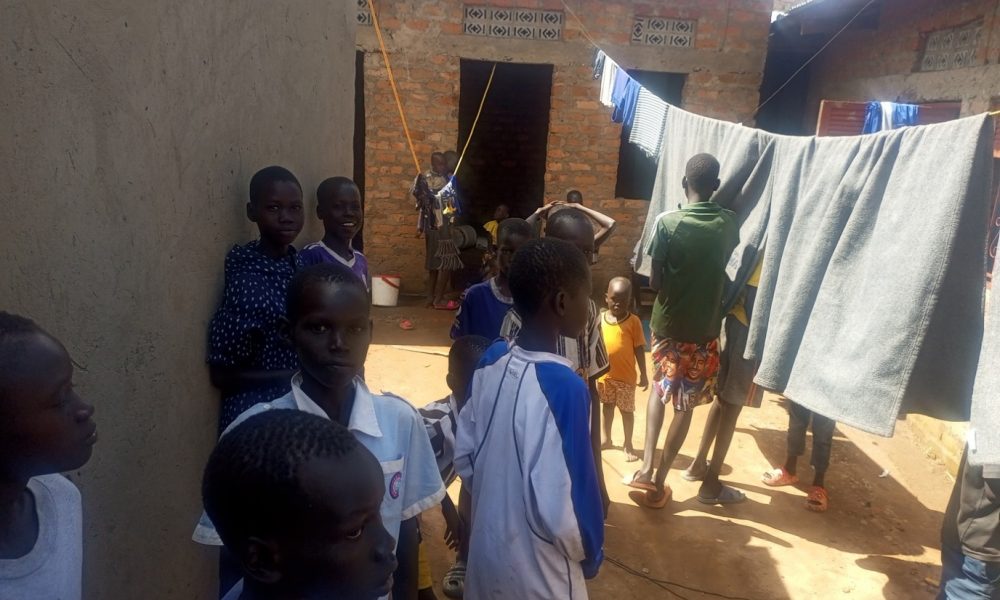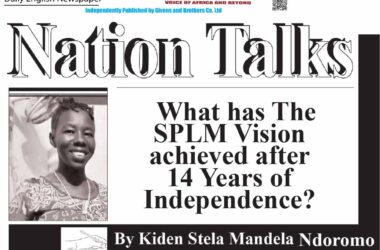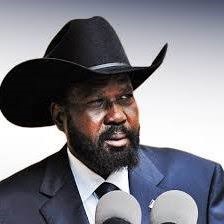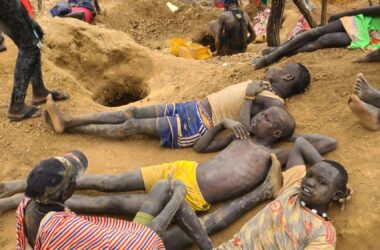By Jurugo Emmanuel Ogasto
A South Sudanese refugee will have to prove his innocence in Uganda’s court of law after an arrest over alleged illegal creation of a camp of children at his home, in Arua City.
Police in Arua city apprehended the suspect identified as William Bok, on Wednesday.
Mr. Bok reportedly collected over 40 children from Tika in Rhino refugee settlement three months ago, and has since been keeping them in Olumini cell, Driwala ward in Ayivu west division.
A tipoff by residents of the locality, citing the poor living conditions of the children helped the security team and the UN agency UNHCR take action, leading to the arrest of the suspect.
An estimated 45 children were found living in an incomplete building that had no windows, a poorly constructed toilet facility, and were sleeping on the floor with very old beddings and mosquito nets.
According to one of the children, they were told they were being brought to Arua town in order to study in the city, but since then they haven’t joined any school.
Speaking to the media while at the scene in Olumini cell during the search, Alice Akello, the Resident City Commissioner of Arua, condemned such an action, saying, “This is abuse to the children.
“We were tipped off about some children staying in very poor conditions. We took the initiative to go there. We found very young children, malnourished; they were all sleeping in one place,” Akello narrated.
“One who struggled to speak English told us they had stayed for 4 days without food. They only get up and move around to get maybe one mango and that is what they would survive on for a day.”
As the head of security in Arua City, Akello described the incident as very “worrying,” given the rising cases of insecurity in the city of late.
“I have always told the Office of the Prime Minister (OPM) that we have more refugees in the city because most of them just go to pick food and stay in the city. This is why we are getting insecurity in the city.”
She stressed that they are now going to work hand in hand with OPM to make sure those who are registered belong to where they are registered, adding that the city is overwhelmed with people they don’t know.
For his part, Omar Acidri, the Local Council 1 (LC1) chairperson of the Olumini cell, said as authorities, they were not aware of how the children were brought.
“I realized when these people had already entered here,” he said. “What I saw was very unique. They have forty-five children. What I did was inform the Office of the Prime Minister (OPM) in Arua. When I reported, they told me to take them so they could be registered, but then they realized that they were registered and questioned why these children were being kept here,” he explained.
Acidri said he shifted the children to another house, which had a better condition, but then they [children] decided to get back to the very house where they were in.
He said the children have been eating once a day, noting that little is known about the children since they only speak the Dinka language.
Sarah Sokke, the Village Health Team (VHT) member of Olumini Cell, raised concern over the nature of the toilet facilities the children were using.
She said the children always move in groups, and since they do not have enough food, they survive on mangoes.
“The food they are eating is not enough. When the women go to the market, the portion of food they come back with makes you wonder how many people are going to eat the food,” she narrated.
During preliminary interrogation by the security, William Bok, the suspect, said the children are all his relatives, and he moved them from the settlement for fear of being attacked in revenge by the relatives of another South Sudanese whom his uncle killed in South Sudan recently.
He told the police that according to their cultural beliefs, they cannot share the same source of water and food when there is conflict between two communities.
“I have a genuine reason. I went up to the deputy camp commandant, and I raised my issue,” the suspect defended himself.
“As I am a Dinka, there is a problem where I am coming from. I told them, “You can even separate me in a different settlement away from my people because there is a reason I came here. They said you can be taken from Tika 4 to Simbili; I really accepted that and appreciated that, because there is a problem I fear for our people,” Bok claimed.
“After that, the technical staff in Ocea could not work on that. They divided my family into three and took my family to Tika, the place I complained of and said I didn’t want to stay in.
“My uncle made a mistake; he killed someone in South Sudan. Then, when I came to the camp, I met with the people, the same tribe, the same clan with whom my uncle made a mistake. But in our culture, you cannot share things like food with people with whom you have killed a relative. I sent this to OPM, but they could not work on it. I really fear for anything that could happen, especially when I leave them [the children] there,” he said, justifying his action.
The suspect was detained at Onduparaka Police Post that evening, where he spent the night; meanwhile, at around 7:30 p.m. on the same day, the children set off for Omugo refugee settlement in Terego district in a UNHCR vehicle.




